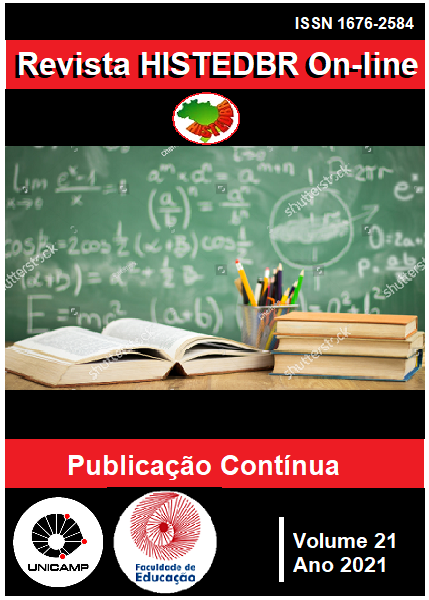Abstract
This article aims to analyze the appropriations of the concepts of Integral Education and Work, in the documents Manifesto of the Pioneers of Educação Nova (1932) and Manifesto Mais Uma Vez Convocados (1959), both produced by intellectuals of different political-philosophical orientations and published at important junctions in the Brazilian educational scenario. The two documents, despite the distance in time of almost three decades, have become milestones in the history of Brazilian education due to their democratic character, by bringing together different groups in defense of public, secular and free schools. In this sense, we seek to understand that the concept of integral education prevails in the aforementioned documents, and the meaning attributed to work as a pedagogical category, insofar as it is also addressed by its signatories. In theoretical and methodological terms, we are guided by historical and dialectical materialism, insofar as we do not only want to present the documents in a descriptive way, but problematize them, highlighting their contradictions, limits and, above all, the disputed corporate projects. Through the analyzes, we found that in the aforementioned documents there are direct relations between Integral Education and Work. We also found that the concept of Integral Education and the pedagogical sense attributed to Work are anchored by the hegemony of the national-developmentalist project of dependent capitalism, whose oscillations are due to internal disputes within the ruling class itself.
References
ALMEIDA, J. de; PINTO, K. N. (Org.). Educação integral no Brasil de hoje. Pernambuco: Editora Universitária (UFPE), 2013.
BRASIL. Lei nº 4.024, de 20 de dezembro de 1961. Fixa as diretrizes e bases da educação nacional. Lei de Diretrizes e Bases da Educação-LDB. Brasília, DF, 1961. Disponível em: http://www.planalto.gov.br/ccivil_03/leis/l5540.htm. Acesso em: 14 dez. 2020.
BRASIL. LEI nº 5.692, de 11 de agosto de 1971. Fixa diretrizes e bases para o ensino de 1º e 2º graus, e dá outras providências. Lei de Diretrizes e Bases da Educação Nacional. Brasília, DF, 1971. Disponível em: https://www2.camara.leg.br/legin/fed/lei/19701979/lei-5692-11-agosto-1971-357752-publicacaooriginal-1-pl.html. Acesso em: 05 dez. 2020.
BUFFA, E. Ideologias em conflito: escola pública e escola privada. São Paulo: Cortez & Moraes, 1979.
CIAVATTA, M. Trabalho como princípio educativo. Dicionário de Educação Profissional em Saúde. Rio de Janeiro: Fundação FioCruz, 2008.
FRIGOTTO, G.; CIAVATTA, M. Trabalho como princípio educativo. In: SALETE, R.; et al. (Org.). Dicionário da educação do campo. Rio de Janeiro, São Paulo: Escola Politécnica Joaquim Venâncio: Expressão Popular, 2012.
GRAMSCI, A. Cadernos do cárcere: volume 2: os intelectuais, princípio educativo, jornalismo. 6. ed. Rio de Janeiro: Civilização brasileira, 2011.
KUENZER, A. Desafios teórico-metodológicos da relação trabalho-educação e o papel social da escola. In: FRIGOTTO, G. (Org.). Educação e crise do trabalho: perspectivas de final de século. 8. ed. Petrópolis, RJ: Vozes, 1998.
MANIFESTO DOS EDUCADORES: mais uma vez convocados (2003 [1959]). In: MAGALDI, A. M.; GONDRA, J. G. (Org.). A reorganização do campo educacional no Brasil. Manifestos, manifestações e manifestantes. Rio de Janeiro: 7 Letras. p. 157-177.
MANIFESTO DOS PIONEIROS da educação nova (2003 [1932]). In: MAGALDI, A. M.; GONDRA, J. G. (org.). A reorganização do campo educacional no Brasil. Manifestos, manifestações e manifestantes. Rio de Janeiro: 7 Letras. p. 125-147.
MONTALVÃO, S. de S. As representações do intelectual no manifesto mais uma vez convocados (1959). AZEVEDO, A. N.; CARVALHO, M. P. (Org.). Revista Intellèctus, ano XIV, n. 2, p. 189-206, 2015.
RAMOS, M. N. História e política da educação profissional. Curitiba: Instituto Federal do Paraná, 2014. (Coleção formação pedagógica, v. 5).
ROMANELLI, O. de O. História da educação no Brasil (1930/1970). 37. ed. Petrópolis, RJ: Vozes, 2012.
SANFELICE, J. L. O manifesto dos educadores (1959) à luz da história. Educ. Soc., Campinas, v. 28, n. 99, p. 542-557, maio/ago. 2007.
SAVIANI, D. História das ideias pedagógicas no Brasil. 3. ed. Campinas, SP: Autores Associados, 2011.
VIDAL, D. G. 80 anos do manifesto dos pioneiros da educação nova: questões para debate. Educ. Pesquisa, São Paulo, v. 39, n. 3, p. 577-588, jul./set. 2013.
XAVIER, L. N. Manifestos, cartas, educação e democracia. In: MAGALDI, A. M.; GONDRA, J. G. (org.). A reorganização do campo educacional no Brasil: manifestações, manifestos e manifestantes. Rio de Janeiro: 7Letras, 2003.
XAVIER, L. N. Para além do campo educacional: um estudo sobre o manifesto dos pioneiros da educação nova (1932). Bragança Paulista: EDUSF, 2002.
XAVIER, M. E. S. P. Capitalismo e escola no Brasil: a constituição do liberalismo em ideologia educacional e as reformas do ensino (1931 – 1961). Campinas, SP: Papirus, 1990.

This work is licensed under a Creative Commons Attribution-NonCommercial 4.0 International License.
Copyright (c) 2021 Cosme Leonardo Almeida Maciel, Lígia Martha Coimbra da Costa Coelho


